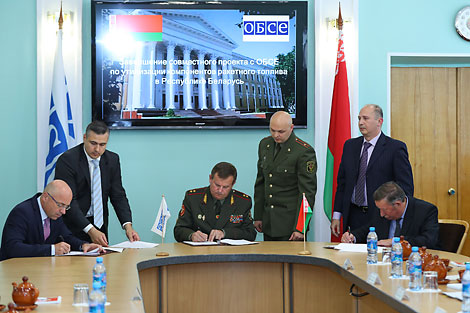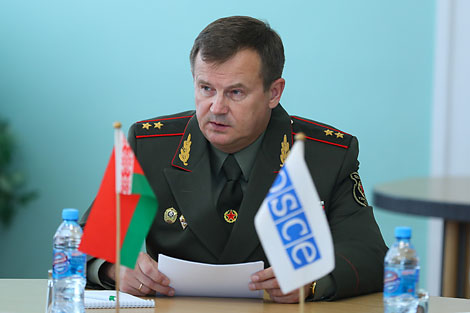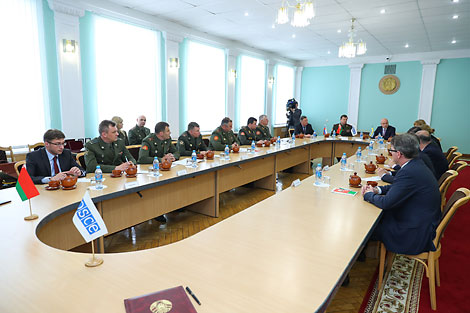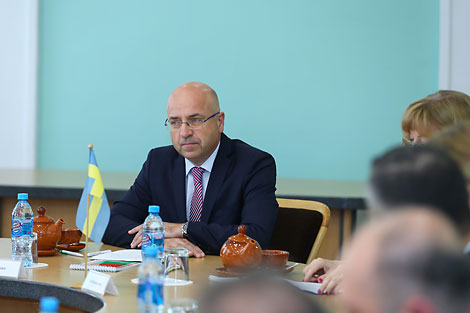Events
Liquid rocket fuel recycling project in Belarus nearing completion
 MINSK, 11 June (BelTA) – A project implemented together with the OSCE to get rid of liquid rocket fuel components in Belarus is nearly over. The relevant certificates were signed in the Belarusian Defense Ministry on 11 June, BelTA has learned.
MINSK, 11 June (BelTA) – A project implemented together with the OSCE to get rid of liquid rocket fuel components in Belarus is nearly over. The relevant certificates were signed in the Belarusian Defense Ministry on 11 June, BelTA has learned.
The document was signed by Belarusian Defense Minister, Lieutenant-General Andrei Ravkov, OSCE Conflict Prevention Center Director Marcel Pesko, and Director General of the enterprise Tekhnoazot Sergei Ushakov. Ambassador Extraordinary and Plenipotentiary of Sweden to Belarus Christina Johannesson also attended the event.
Nearly 690 tonnes of liquid rocket fuel components previously stored by the Belarusian army was transported for utilization and processing in 2017 in association with the OSCE, Sweden, and the Russian enterprise Tekhnoazot.

 The Belarusian government and the OSCE signed the memorandum of understanding on the joint project designed to get rid of the available reserves of liquid rocket fuel components when OSCE Secretary General Lamberto Zannier visited Minsk in June 2015. The document became the foundation for the consequent implementation of the project. Sweden played an important part by acting as a financial donor. A trilateral contract was signed in December 2016 and a technical agreement was signed in February 2017. In line with the documents more than 187 tonnes of TM-185 and samin fuel components was transported to Swedish plants and burned there. As of 9 November 2017 all the Belarusian TM-185 and samin fuel reserves were recycled.
The Belarusian government and the OSCE signed the memorandum of understanding on the joint project designed to get rid of the available reserves of liquid rocket fuel components when OSCE Secretary General Lamberto Zannier visited Minsk in June 2015. The document became the foundation for the consequent implementation of the project. Sweden played an important part by acting as a financial donor. A trilateral contract was signed in December 2016 and a technical agreement was signed in February 2017. In line with the documents more than 187 tonnes of TM-185 and samin fuel components was transported to Swedish plants and burned there. As of 9 November 2017 all the Belarusian TM-185 and samin fuel reserves were recycled.
Rocket fuel oxidizing agent of the mélange variety was transported to Russia for processing. The final fifth batch of 92 tonnes was shipped in December 2017. The implemented joint project on utilizing the liquid rocket fuel components helps bolster security in Eastern Europe, noted Andrei Ravkov.
 In turn, Marcel Pesko congratulated those present on the results of the project. “Those chemical substances were a threat to the environment and the population. Besides, Belarus did not have the technical capability to accomplish the task on its own. We met huge support, professionalism, a constructive attitude in Minsk, particularly in the Defense Ministry, and managed to realize the project. Belarus is now one of the European leaders in this area and can share its experience with other countries,” he said.
In turn, Marcel Pesko congratulated those present on the results of the project. “Those chemical substances were a threat to the environment and the population. Besides, Belarus did not have the technical capability to accomplish the task on its own. We met huge support, professionalism, a constructive attitude in Minsk, particularly in the Defense Ministry, and managed to realize the project. Belarus is now one of the European leaders in this area and can share its experience with other countries,” he said.
 Christina Johannesson also noted that Sweden works hard in the area of environmental protection, including in the international scene. “In this case assistance was granted for the sake of bolstering the environmental protection safety and stability of Belarus. Financial aid within the framework of the project totaled €1.3 million,” she stated.
Christina Johannesson also noted that Sweden works hard in the area of environmental protection, including in the international scene. “In this case assistance was granted for the sake of bolstering the environmental protection safety and stability of Belarus. Financial aid within the framework of the project totaled €1.3 million,” she stated.
Besides, during the solemn event held to celebrate the end of the fuel recycling project the sides discussed the state and prospects of Belarus-OSCE cooperation in military affairs.








 print version
print version make home page
make home page add to bookmarks
add to bookmarks

